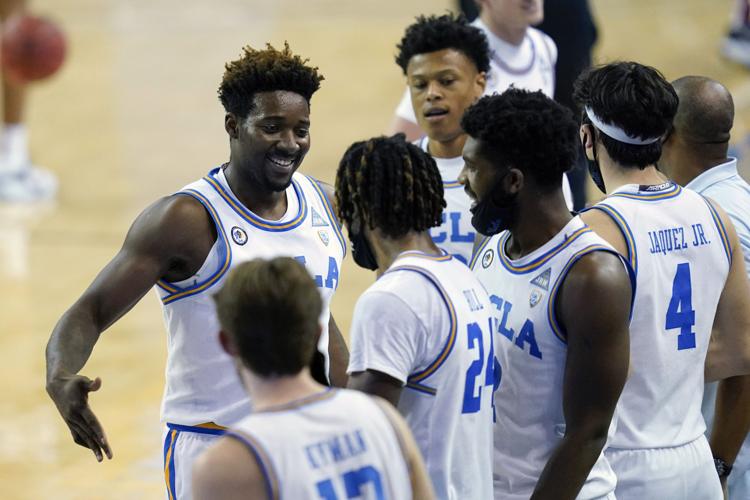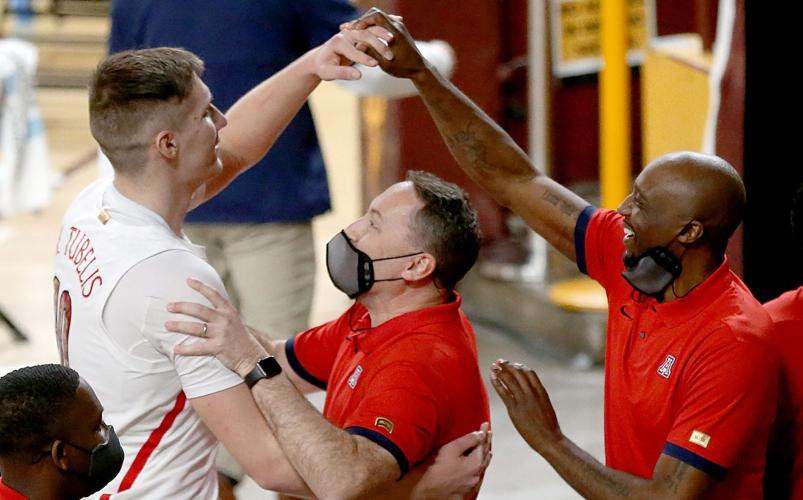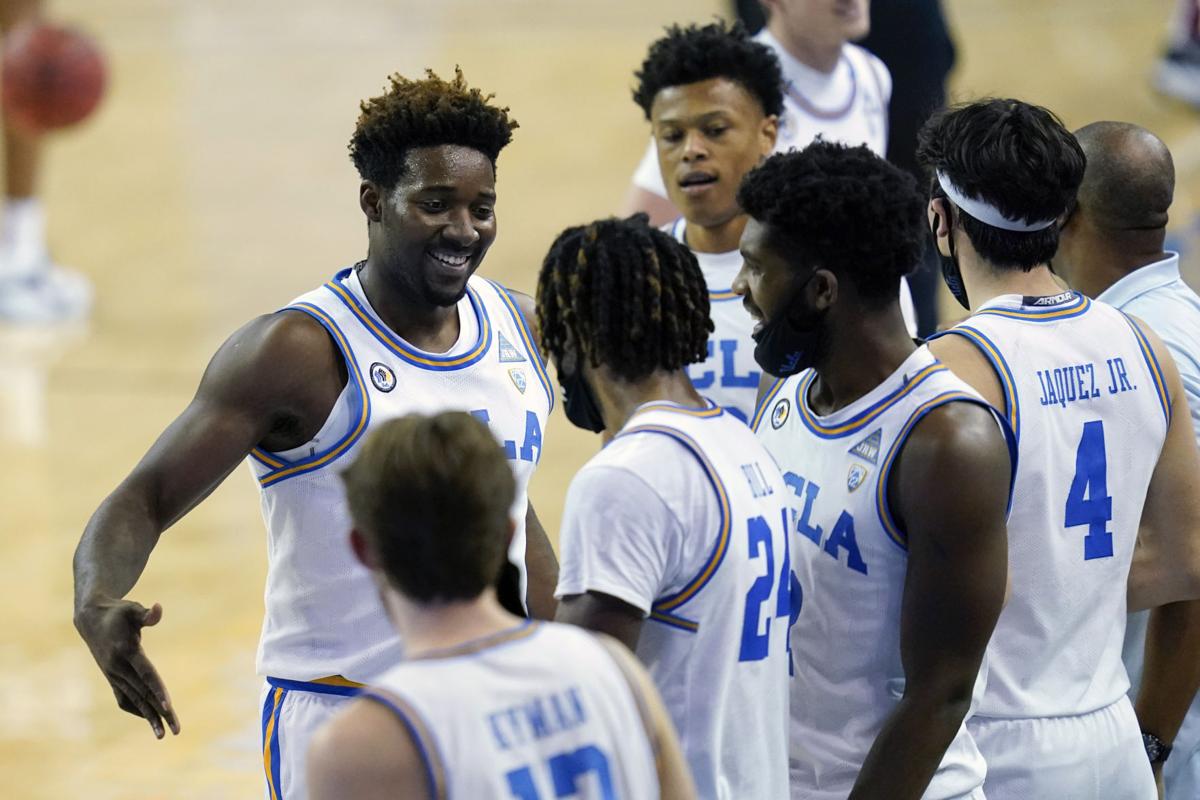Four days after Arizona lost a third straight game to Oregon by a single possession, coach Sean Miller was still taking credit for it.
“They’ve beaten us six times in a row, but it’s really unique because I’d say four of them really came down to the single last play of the game — and we’ve not been on the positive end,” Miller said Wednesday. “I have to own that. We have to own that. That’s not OK.”
So what happens Thursday, when Arizona heads into Pauley Pavilion with even more history that isn’t on their side? The Bruins have beaten the Wildcats four straight times and, this season, UCLA has a much more proven ability to close out tough games.
UCLA is 9-1 in games decided by five points or less (or in overtime), while the UA is 3-4 in those games — and those wins included a three-point victory over low-major Eastern Washington, a double-OT hair-raiser at Washington State and an 84-82 game at ASU in which the Wildcats had led by up to 11.
Moreover, the UA isn’t trending in the right direction, with its last two losses decided by just five total points, at Colorado (82-79) and at home against Oregon (63-61), while UCLA’s last four wins have all been by five points or less.
The Bruins have also lost three games over that stretch while dealing with a limited frontcourt, with forward Chris Smith out with an ACL, Cody Riley tweaking his ankle and Jalen Hill dealing with unspecified personal issues. But they might have lost all of their last seven games without something extra at the end.
“I think you have to give Mick (Cronin) and his coaching staff a lot of credit,” Miller said. “When you constantly win those close games, you’re doing a lot of things right as a basketball team but also you have a coaching staff that’s very sure of themselves, that obviously is pressing the right buttons.
“The other part of UCLA is they’re in a lot of close games. too. That’s not to discredit them but they’re grinding some of these games out, getting to that last four minutes and making key plays.”
How does Arizona start grinding some close ones out? In theory, at least, here’s a few simple things that could help:
1. Avoid them in the first place.
The fact that James Akinjo couldn’t set up a game-winning play, and Kerr Kriisa couldn’t make a game-winning shot against Oregon might not have mattered … if the Wildcats didn’t trail Oregon 13-5 and 22-12 early.
Nor would Evan Battey’s four free throws in the final 15 seconds at Colorado matter … if the Wildcats didn’t slump to a 19-2 deficit out of the gate.
Or, going back to Arizona’s first Pac-12 game of the season, maybe Akinjo’s charging foul with seven seconds left doesn’t help result in Stanford’s 78-75 win … if the Wildcats don’t trail 15-5 early.
“Everybody’s critical of the end, and I understand that,” Miller said. “You’re also very gracious if it goes well — ‘What a great last shot played, etc. But every play of the game has equal meaning. If the deficit is seven or six, not 11, you can make the argument that maybe you’re in a different dilemma in the last four minutes.
“(It’s) finishing the first half, early in the second half, coming out after the break and being ready. All those moments and segments of the game, they’re all the same.”

UA forward Azuolas Tubelis gets congratulated by associate head coach Jack Murphy and assistant coach Jason Terry after hitting a game-winner on Jan. 21, 2021 at ASU.
2. Live and learn
UCLA clearly has an experience advantage over Arizona, returning nearly the entire team from a second-place finisher last season plus Kentucky transfer Johnny Juzang, but the Wildcats have already received a number of lessons over 21 games so far.
The last one may have been their toughest lesson yet, a brain-stretching final 30 seconds against Oregon that Miller described as something of a rapid-fire chess match.
The Wildcats defended most of Oregon’s final possession capably, forcing Will Richardson to drive inside, skirt out to the right corner, and pass back and forth to Chris Duarte. But they then broke down and let Duarte open to take another pass from Richardson he turned into a game-winning 3.
Then Arizona had to play offense, with Oregon throwing a wrench into their last play because fouled the Wildcats with 1.1 seconds left, when Arizona was still not in the bonus.
“No matter what play you draw, you have to take into consideration that they may not let that play happen, simply because at that point they had foul to give,” Miller said.
“And you’ve got to be careful in calling any play because you don’t have a guarantee that they’re not going to press. There’s a lot going on, especially with the younger group.”
The Ducks’ foul forced Kerr Kriisa to toss up a last second 3-pointer off an inbounds pass when Azuolas Tubelis was not open inside. Miller said Kriisa might have picked up a foul if he had leaned toward the lunging Ducks forward LJ Figueroa, but he didn’t and the shot didn’t fall.
“You guys just have to understand that if it’s quarter court side out of bounds against Oregon, No. 1, it’s ‘Are they going to be in zone or man?’” Miller said. “That’s something to really consider. You want to have something that works against both, because they can do either with one second left. If you can get a decent shot with one (second left). Wow. … We had a chance. It didn’t work.”
UCLA, meanwhile, learned a lot of its tough lessons last season, going 7-9 against Division I opponents before a midseason breakthrough brought them all the way into second place.
“What we ended up doing at the end of last year was we just started doing exactly what coach told us on defense,” Bruins guard Tyger Campbell said. “We weren’t out to lunch, and we’re just ready to play when we came into game.”
3. Hang in there.
While Miller praised Cronin for pulling games out, his former cross-Cincinnati rival (when Miller was at Xavier and Cronin at Cincinnati) says Miller has done well keeping the Wildcats motivated even though they have no postseason prospects to play for.
“When you watch them play, there’s zero checkout in them. Zero checkout,” Cronin said. “I mean, they’ve got young guys. They’re building for the future, and the way they compete is just a staple of his teams. I’ve known Sean a long time, and he keeps them competing … I’m just really impressed with how hard they just continue to play.”
Now with only as few as four games left to play, since their postponed Jan. 16 game at Oregon still has not been rescheduled, Miller will find out if the Wildcats can keep their intensity up at least.
Miller said he saw evidence in practice this week that they will.
“When you go to L.A. those games are always difficult,” Miller said. “We’re hoping that we can play really well in both games, and the outcome will take care of itself.
“But we’re also not sitting around here, legs crossed, saying, ‘Hey, we don’t have a postseason.’ We’ve known that for a long, long time. I think if you were at the practice (sessions this week) you would look at our group as hard working, together, competing and we’ve been that type of team all year long.
“When you do that, a lot of times that leads into the next game or the next week.”






